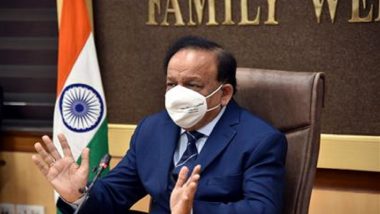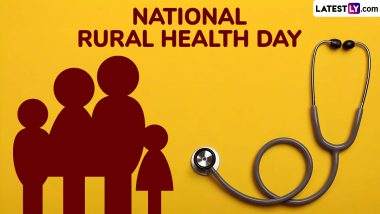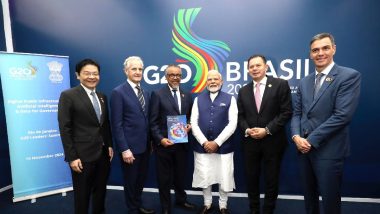New Delhi, March 24: Union Health Minister Harsh Vardhan on Wednesday said paramedics and allied healthcare workers are a critical part of the medical profession and their contribution is similar to doctors, if not more.
Initiating the debate on the National Commission for Allied and Healthcare Professions Bill, 2021, Vardhan said the proposed legislation has the potential to bring a paradigm shift in health professionals' situation. Dr Harsh Vardhan Inaugurates New Advanced High-Resolution Microscopy Facility at NABI in Mohali.
"The paramedics and allied healthcare workers are critical part of the medical profession and their contribution is similar to doctors, if not more. The group of allied professionals is large and the bill is trying to regulate this field, by providing dignity to their roles," he said. The bill has already been passed by the Rajya Sabha.
Recalling the role played by paramedics and allied health care workers lab technicians, radiographers, dieticians during the Coronavirus pandemic, the minister said they were as much part of the people's recovery as the doctors.
He said the bill aims to establish a statutory body or commission that frames policies and standards, regulate professional conduct and qualifications for allied healthcare professionals besides providing uniformity of service standards across institutions.
Vardhan said all standards have been coded by international yardsticks and there will be representations from all States and Union Territories on this commission with each state having state-level commissions. "A common regulator has been prepared for all allied professions. This will enable a team-based approach to patient care," he said.
The bill provides for regulation and maintenance of standards of education and services by allied and healthcare professionals, assessment of institutions, maintenance of a central and a state register and creation of a system to improve research and development and adoption of latest scientific advancement.
The allied and healthcare professions include a wide range of workers for diagnosis, evaluation and treatment of acute and chronic diseases. These professions also work to optimise patient outcomes and attend to overall prevention, promotion, wellness and management of diseases.
As per the statement of objects and the reasons of the bill, the advancement in the health sector, changing preferences of consumers and service providers, had warranted creation of a fresh vision of healthcare delivery with a patient-centric approach and focus on moving to a multi-disciplinary team-based care.
"This has necessitated the need to implement new ways of deploying health workers, strengthening the workforce by task-shifting models and improving access to quality services through qualified and competent allied and healthcare professionals," it added.
Earlier in December 2018, the Allied and Healthcare Professions Bill, 2018, was introduced in the Rajya Sabha and the same was referred to the Department Related Parliamentary Standing Committee, which after a detailed examination recommended certain amendments.
Therefore, it was withdrawn and a new bill called the National Commission for Allied and Healthcare Professions Bill incorporating the recommendations made by the panel, was introduced last year.
A total of 110 recommendations were made by a parliamentary committee on it and the government accepted 102 while six recommendations were accepted with slight modifications. Only two recommendations were not incorporated.
Participating in the debate, Congress member Balubhau Narayanrao Dhanorkar said his party supports the bill as allied healthcare workers are a key to providing treatment to the patients. He said the allied health workers have worked very hard, especially during the pandemic and deserve to be taken care of.
Dhanorkar, however, said it is sad that the government does not have any figure about how many of these allied health workers passed away while fighting the pandemic.
BJP member Subhash Bhamre said the bill reflected that the Narendra Modi government is dedicated to the service of the poor and through the bill the government wants to bring over 50 types of professionals under the regulatory network.
"The bill has the potential to bring path-breaking changes in the healthcare services. It is a landmark bill for the welfare of the allied healthcare professionals," he said.













 Quickly
Quickly




















